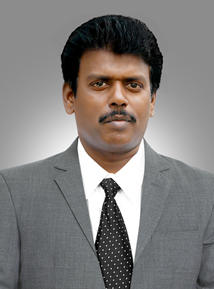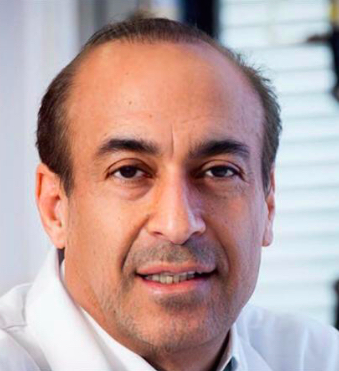Keynote Speakers
Prof. Sivakumar Manickam
Department of Petroleum and Chemical EngineeringFaculty of Engineering
Universiti Teknologi Brunei
Brunei Darussalam
Speech Title: Greener and Energy-Efficient Cavitation Assisted Process Intensification for the Generation of Nanomaterials
Abstract: Much effort is currently being devoted to studying nanomaterials, mainly due to their wide variety of applications. Particularly, nanoparticles have generated a large research effort because their properties differ markedly from those of their bulk counterparts. Many different approaches have been applied to the fabrication of nano-entity, such as co-precipitation, microemulsion, supercritical sol-gel processing, hydrothermal synthesis, or high energy ball milling. Directed to the problems of these conventional methods, new synthetic methods have received increased attention in recent years. Cavitation, an approach for synthesizing various compounds at milder conditions, is already the rage in materials engineering. The major advantage of this new method is that it affords a reliable and facile route for controlling both the synthetic process and nanostructure in advanced materials. Also, this process provides chemical homogeneity and reactivity through atomic-level mixing within the precursor system, and phase pure crystalline materials can be prepared by annealing at reduced temperatures. Various nanomaterials and nanodispersions have been generated using this technique to develop biosensors and other applications. More importantly, novel carbon materials such as Graphene and Fullerene have been exploited for the functionalization and in the development of nanocomposites to be employed in the sensors.
References
1. Sze Shin Low, Maxine Yew, Chang Nong Lim, Wai Siong Chai, Liang Ee Low, Sivakumar Manickam, Beng Ti Tey, Pau Loke Show, Sonoproduction of nanobiomaterials – A critical review, Ultrasonics Sonochemistry, 82, 105887, 2022
2. Jayachandrabal Balachandramohan, Randeep Singh, Thirugnanasambandam Sivasankar, Sivakumar Manickam, Sonochemical Synthesis of Highly Efficient Ag3PO4-Guar Gum Nanocomposite with Photo-oxidation Property under Visible Light Irradiation, Chemical Engineering and Processing: Process Intensification, 168, 108549, 2021.
3. Renu Geetha Bai, Kasturi Muthoosamy, Meifang Zhou, Muthupandian Ashokkumar, Nay Ming Huang and Sivakumar Manickam, Sonochemical and Sustainable Synthesis of Graphene-Gold (G-Au) Nanocomposites for Enzymeless and Selective Electrochemical Detection of Nitric Oxide, Biosensors and Bioelectronics, 87, 622-629, 2017
4. Sadia Afreen, Kasturi Muthoosamy, Sivakumar Manickam and Uda Hashim, Functionalized Fullerene (C60) as a potential Nanomediator in the fabrication of highly sensitive Biosensors, Biosensors and Bioelectronics, 63, 354-364, 2015
5. Renu Geetha Bai, Neethu Ninan, Kasturi Muthoosamy and Sivakumar Manickam, Graphene: A Versatile Platform for Nanotheranostics and Tissue Engineering, Progress in Materials Science, 91, 24-69, 2018
6. Sadia Afreen, Ken Kokubo, Kasturi Muthoosamy and Sivakumar Manickam, Hydration or Hydroxylation: Direct Synthesis of Fullerenol from Pristine Fullerene (C60) via Acoustic Cavitation in the presence of Hydrogen Peroxide, RSC Advances, 7, 31930-31939, 2017
7. Renu Geetha Bai, Kasturi Muthoosamy, Fiona Natalia Shipton, Alagarsamy Pandikumar, Perumal Ramesh Kumar, Nay Ming Huang and Sivakumar Manickam, The Biogenic Synthesis of Reduced Graphene Oxide-Silver (RGO-Ag) Nanocomposite and its Dual Applications as Antibacterial Agent and Cancer Biomarker Sensor, RSC Advances, 6(43), 36576-36587, 2016
Biography: Professor Sivakumar Manickam is a Chemical Engineer specializing in the process engineering of nanomaterials, especially nanopharmaceuticals. Currently, he is working with UTB, Brunei and earlier, and he was working with the University of Nottingham, International Campus, Malaysia. His research focuses on the process development of cavitation-based reactors towards technologically important nanomaterials, greener extraction of natural products, water treatment, development of pharmaceutical nanoemulsions and utilizing novel carbon nanomaterials to design biosensors for the earlier detection of cancer and diabetes. He took various leadership roles at the University of Nottingham, including Director of Research, Founding Director for the Centre for Nanotechnology and Advanced Materials, Head - Manufacturing and Industrial Research Division and Associate Dean for Research and Knowledge Exchange. He has completed more than 20 industrial and government-funded projects and supervised more than 50 research students. He has published ~250 peer-reviewed journal and conference papers. His h-index is 51 (scholar google). He is also the Executive Editor of Ultrasonics Sonochemistry (Elsevier, Q1, IF 7.5) Journal. He serves as a board member of the Asia Oceania Sonochemical Society (AOSS), as well as the Fellow of the Higher Education Academy (UK) and Fellow of the Royal Society of Chemistry (FRSC).
Prof. Alexander Seifalian
CEO and Professor Nanotechnology & Regenerative MedicineNanotechnology & Regenerative Medicine Commercialisation Centre (Ltd)
London BioScience Innovation Centre
London, United Kingdom
Speech Title: Graphene, butterfly, and stem cells are set to revolutionise the development of human organs
Biography: Alexander Seifalian, Professor of Nanotechnology and Regenerative Medicine worked at the Royal Free Hospital and University College London for over 26 years, during this time he spent a year at Harvard Medical School looking at caused of cardiovascular diseases and a year at Johns Hopkins Medical School looking at the treatment of liver cancer. He published more than 687 peer-reviewed research papers and registered 14 UK and International patents. On editorial boards of 41 journals. He supervised 121 PhD students, all successfully completed. He is currently CEO of NanoRegMed Ltd, working on the commercialisation of his research. During his career, Prof Seifalian has led and managed many large projects with successful outcomes in terms of commercialisation and translation to patients. In 2007 he was awarded the top prize in the field for the development of nanomaterials and technologies for cardiovascular implants by Medical Future Innovation, and in 2009 he received a Business Innovation Award from UK Trade & Investment (UKTI). He was the European Life Science Awards’ Winner of Most Innovative New Product 2012 for the “synthetic trachea”. Prof Seifalian won the Nanosmat Prize in 2013 and in 2016 he received the Distinguish Research Award in recognition of his outstanding work in regenerative medicine from Heals Healthy Life Extension Society. His achievements include the development of the world first synthetic trachea, lacrimal drainage conduit, and vascular bypass graft using nanocomposite materials, bioactive molecules and stem cell technology. Currently, he is working on the development and commercialisation of human organs using graphene-based nanocomposite materials and stem cells technology. Recently he has commercialised a novel functionalised graphene oxide for medical and other industrial applications and synthetic graphene-based nanocomposite materials for surgical and medical devices application. He is currently working on the development of facial organs, heart valves and tendons.
ORCID: https://orcid.org/0000-0002-8334-9376
https://scholar.google.com/scholar?q=seifalian&hl=en&as_sdt=2007
List of speakers will be updated soon...


